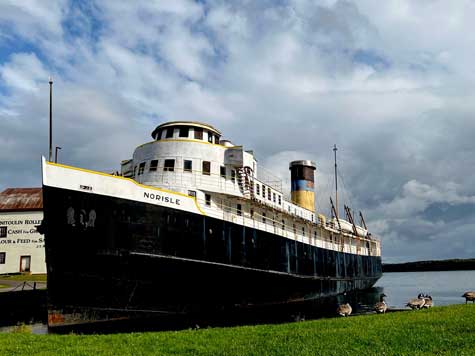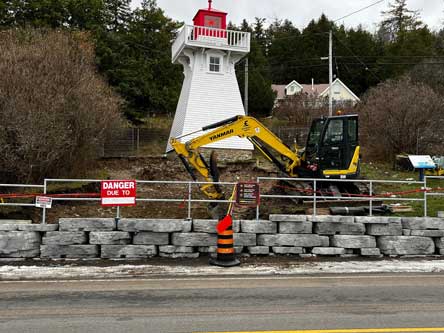THUNDER BAY—Hundreds of tourism stakeholders gathered in Thunder Bay recently for the first in-person Northern Ontario Tourism Summit since the start of the pandemic. The Northern Ontario Tourism Summit (NOTS) is a partnership event between Nature and Outdoor Tourism Ontario (NOTO) and Destination Northern Ontario (DNO).
The collaboration seeks to bring together tourism businesses, organizations and suppliers as well as all levels of government at a single event to find solutions to challenges facing the industry.
The unique event hosts training workshops, information sessions and problem-solving workshops that venture outside of the box, as well as keynote speakers, networking opportunities and a trade show aimed at the tourism industry.
“NOTS is critical to tourism operators to gain current insights and important tourism knowledge,” said Indigenous Tourism Ontario CEO Kevin Eshkawkogan. “For example, participants learned that with over 100 First Nations in Northern Ontario, it is in an amazing position to not only rebound from the pandemic but thrive and lead the world on the tourism front.”
“Access to pristine wilderness and Indigenous tourism experiences are two offerings the domestic and international consumers are demanding,” said Mr. Eshkawkogan. “Northern Ontario has both and is perfectly positioned to maximize this economic opportunity.”
“The last time we met in person was 2019 in Timmins,” said DNO Executive Director David McLaughlin. “During the pandemic we did offer training sessions online, but we are very glad to be back in Thunder Bay where the next session was supposed to be.”
Mr. McLaughlin pointed out that NOTS provides subject matter that is tailored to Northern Ontario. “So, it is a great opportunity for people to get together, to learn and to network.” The sharing of best practices provides a tide that helps to raise all boats.
The summit also allows for taking the temperature of the tourism industry in Northern Ontario.
Although the numbers attending NOTS were not up to pre-pandemic standards, it was still a good turnout that allowed for a reasonably accurate read.
“I think, overall, the industry in Northern Ontario is very upbeat and positive,” said Mr. McLaughlin. He noted that in many cases, especially the road-accessible resorts and accommodations operations, Northern Ontario actually did better than many in the south, although many fly-in camps in the Northwest did have a rough ride through the pandemic.
“With the last of the border restrictions being lifted that should make a difference,” he said. “A number of operations are booking from their previous clientele and 50 percent of 2019 bookings are expecting to be coming back.”
Product development in Northern Ontario, a perennial challenge, is also on a positive trend with many new investments being made in tourism operations.
As for the future of the industry, Mr. McLaughlin said that many in the industry are looking toward new product offerings and experiential tourism that meets the demands of a new type of traveller.
“Where before they were dependant on the traditional fishing and hunting market, many have upgraded their operations to appeal to a more family-oriented experience,” he said. He noted his own operation north of Wawa is seeing more and more customers bringing their whole family. “People might just want to go for a canoe ride or some other ‘softer’ product.”
The cruise ship industry has also advanced dramatically. “With large operators like Viking Cruise Lines coming into the Great Lakes it adds a lot of credibility to the region,” said Mr. McLaughlin. “That makes other companies sit up and take notice.”
Recreational vehicle or RV touring is another facet that is growing with a great deal of potential.
“I just returned from Europe where we met with 50 tourism operators,” he said. “There is a lot of interest, especially in Germany.”
Mr. McLaughlin noted that innovations such as e-bikes and other outside-the-box approaches are also providing a boost to tourism opportunities.
“It was such a pleasure to attend the many educational sessions and workshops at the summit,” said newly-appointed DNO board member Shannon McMullan of Perivale Gallery in Spring Bay. Among the “enlightening sessions” noted by Ms. McMullan were those focussed on digital trends in tourism; an interactive workshop which showcased the latest trends and identified what works and what doesn’t in social media; welcome back the post pandemic traveller; what to expect short term and long term from the domestic and international travel markets; exploring the impact of demand, labour, supply chain and how that relates to pricing and booking trends; the shift in needs and expectations of today’s traveler and how that impacts your tourism business; and attracting and retaining talent in the new world of work; and how to attract engage and retain employees.
Ms. McMullan noted NOTS also focused on “attracting tourists and talent how to build a 2SLGBT+ friendly workplace, community and website, how integrating small and thoughtful changes in approach to digital outreach can dramatically expand a businesses’ viability to underrepresented communities, and how authentially reflecting LGBT+ communities on your website and in your marketing can signal safe spaces to visit and enjoy.”
A critical focus was also placed on the challenges of attracting and retaining staff in peak season while navigating a competitive talent market.
Ms. McMullan also cited ‘Science North in and for all of Northern Ontario’ ‘and its northwest expansion project.
“Over the next five years Science North will build new visitor attractions in Thunder Bay, Lake of the Woods and Kenora to expand its outreach across the north,” she said.
The final analysis from NOTS this year according to Mr. McLaughlin is that there is a lot of optimism in the tourism industry and 2023 may well prove to be the best year for tourism in Northern Ontario yet.





